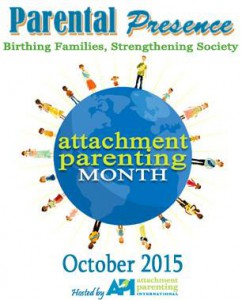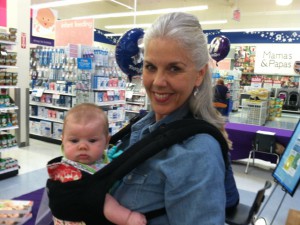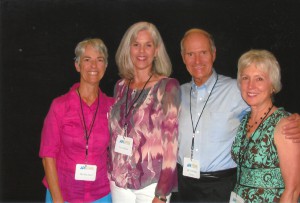Editor’s note: Thank you for helping Attachment Parenting International (API) observe Attachment Parenting Month 2015 in October as we explored the theme, “Parental Presence: Birthing Families, Strengthening Society.” API Leader and API’s KnowledgeBase Coordinator Artimesia Yuen has compiled a research paper to help you continue discussions in your families and communities on the importance of parental leave following the birth of a baby and the incredible value of maximizing parental presence in early childhood.
 API advocates knowledge and practices that value and maximize parental leave, recognizing parental presence with a child fosters early secure attachment and benefits families, businesses and societies.
API advocates knowledge and practices that value and maximize parental leave, recognizing parental presence with a child fosters early secure attachment and benefits families, businesses and societies.
Parental leave is an issue that touches the majority of adults around the world as parents are commonly employed outside of the home. Many countries have implemented national policies that prioritize and value the unique and irretrievable impact that parents have in the early years of their child’s development. The collective international policies represent a global consensus that the United States has not yet considered on a national level.
Only very recently, a few U.S. city and state governments have offered forms of parental leave. The media has been tracking high-profile businesses that have been initiating their own parental leave policies. While the U.S. Federal government offers its own employee benefits, there is not yet a national policy providing these benefits to all U.S. parents.
Momentum is growing for parental leave in the United States, and we have the benefit of a wealth of examples and longitudinal research provided by initiatives in other countries. All of this experience and research, including of U.S. economic research, complements the findings of decades of attachment research.
The U.S. workplace culture, and that of many other countries, is such that even parents and decision makers who recognize the benefits of parental leave may still experience one or more of these pervasive cultural barriers or responses:
* Businesses offering or contemplating offering parental leave may experience real or perceived fears of:
- Loss from temporary slow down or loss of valuable employees, skills and functions
- Competitive disadvantage
- Higher costs, lost opportunities and lost profitability.
* Employees taking or contemplating taking parental leave may experience real or perceived fears of:
- Outright job loss
- Inability to afford unpaid leave or severe financial difficulty
- Inability to tolerate potential lower status and/or pay
- Reduced earnings trajectory over time — i.e., work-cultural stigma.
Additional factors that can present barriers to parental leave may include:
- Societal and cultural norms do not support and sometimes undermine leave.
- Loss and risk aversion are well-known cognitive heuristics impact leave decisions.
- Our nation and economy differ in significant cultural, political, economic and philosophical ways from other advanced nations that offer generous leave. The translation of other successes is not always clear for U.S. business and policy decision makers.
- Time frames and incentives may be mismatched if leave decisions produce “fuzzy,” long-run results when policy makers and businesses seek clear impact over shorter time horizons.
Moving beyond these self-reinforcing fears will require more parents, employers and governments step up to “be the change.” These pioneers and would-be pioneers require support and a broad groundswell of advocacy to stand behind them and propose the policies that all U.S. families deserve.
For more than 20 years, Attachment Parenting International has been working to spread the knowledge that early secure attachment and consistent and loving care are vital to infant development and well-being. API not only brings this research to families, communities and professionals, but has also developed API’s Eight Principles of Parenting and accredited networks of local, personal support that helps sustain healthy parenting and care practices.
API’s Role in Parental Leave
- Promoting the benefits of parental presence, attachment and parenting particularly after birth and in the early, formative years.
- Continued work toward raising up the socially important, economically valuable role of the parents in child mental health and development.
- Continued direct parent support around choices that favor healthy, close parent-child relationships.
- Support parental goals toward long-run workplace change that benefit parents, children and family well-being as critical to societal success.
Support for parents who do not have access to parental leave:
API’s Eight Principles of Parenting provide support for parents in a number of ways to help provide healthy parent-child relationships, especially when parent-child time is limited. These supports might include the following practices:
- Feed with love and respect — API supports parents in establishing and maintaining breastfeeding, pumping and evening reunions that support these practices in feeding and closeness as well as rest for the parents.
- Use nurturing touch — API supports parents in healthy and affectionate touching, holding, cuddling and even carrying their young children in soft carriers as a way to regularly reconnect after being apart.
- Ensure safe sleep physically and emotionally — API supports parents in healthy and safe ways to satisfy both the parent needs for required rest and their young child’s needs for closeness and reconnection after being apart. Safety is paramount.
- Provide consistent, loving care — API supports parents in considerations for providing a healthy caregiving experience for their young children.
- Strive for balance in personal and family life — API supports parents in considering the multiple ways parents can maintain and restore personal and family equilibrium through the many changes of childhood. Parents are supported in any general emotional experience that may result from being apart from their children sooner, earlier or more than desired.
Support for parents who have access to parental leave:
API’s Eight Principles of Parenting provide support for parents in a number of ways to help provide healthy parent-child relationships in situations where parent-child time must transition, even when it’s maximized. These supports might include the following practices:
- Feed with love and respect — API supports parents in establishing and maintaining a variety of strategies in response to changing parent and child needs around breastfeeding, pumping, feeding over time and the relationship with feeding and parent-child reunions.
- Use nurturing touch — API supports parents in healthy and affectionate touching, holding, cuddling and even carrying their young children in soft carriers as a normative way to be together as well as a way to satisfy reconnection needs after being apart.
- Ensure safe sleep physically and emotionally — API supports parents in healthy and safe ways to satisfy both the parent needs for required rest and their young child’s needs for closeness and reconnection after being apart. Safety is paramount.
- Provide consistent, loving care — API supports parents in considerations for providing a healthy caregiving experience for their young children and support for transitions to non-parental care.
- Strive for balance in personal and family life — API supports parents in considering the multiple ways parents can maintain and restore personal and family equilibrium through the many changes of childhood and the parent work status. Parents are supported in any general emotional experience that may result from being apart from their children sooner, earlier or more than desired. Parents are supported in any general emotions around the differences in the pace of life and competencies that may exist between career and 24/7 parenting.
Interested in learning more? Read API’s AP Month 2015 Research Paper in full, including results from selected research studies.











